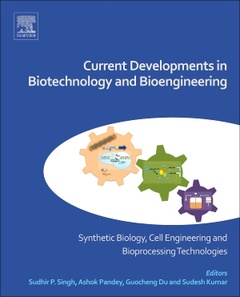Description
Current Developments in Biotechnology and Bioengineering
Synthetic Biology, Cell Engineering and Bioprocessing Technologies
Coordinators: Singh Sudhir P., Pandey Ashok, Du Guocheng, Kumar Sudesh
Language: English
Subject for Current Developments in Biotechnology and Bioengineering:
Keywords
2-Butanol; Artemisinin; Artificial circuit; Bioenergy; Biofuel; Biofuels; Biomanufacturing platform; Biomolecule; Biomolecules; Bioprocess engineering; Biosensor system; Biosensor; Biosynthetic pathway; Cell engineering; Cell-free synthetic biology; Cell-free system; cis-element; Corynebacterium crenatum; Corynebacterium glutamicum platform; CRISPR/Cas; CRISPR/Cas9Crop improvement; CRISPR; CRISPRi; Designer cells; DNA assembly; DNA synthesis; DNA-binding domain; Dynamic regulator; Environment; Enzyme application; Enzyme engineering; Enzyme; Enzymes; Epigenomic editing; Escherichia coli; Evolutionary engineering; Expression system; Fermentation; Gene stacking; Gene; Genetic circuit; Genetic engineering tools; Genetic engineering; Genome editing; Genome engineering; Heterologous production; High-value amino acids; Industrial production; Isoprenoids; l -Arginine; Meganucleases; Membrane protein; MEP pathway; Metabolic engineering; Metabolism; Metabolites; Microbial cell factory; Molecular modification; MVA pathway; Nonstandard amino acid; Pathway design; Pathway engineering; Phytochemicals; Plant synthetic biology; Plant; Platform organisms; Posttranslational regulator; Promoter engineering; Promoter; Protein complex; Protein engineering; Purification process; Riboswitch; Secondary metabolite pathways; Small molecule natural products; Synbio; Synthetic biology; Synthetic gene circuits; Synthetic promoter; System metabolic engineering; Systems biology; Systems metabolic engineering; TALEN; Testing platform; Transcription factor; Transcription factors; Transcription; Transcriptional regulation; Transcriptional regulator; Translational regulation; Translational regulator; Unnatural amino acid; Zinc-finger nucleases
442 p. · 19x23.3 cm · Paperback
Description
/li>Contents
/li>Readership
/li>Biography
/li>Comment
/li>
Current Developments in Biotechnology and Bioengineering: Synthetic Biology, Cell Engineering and Bioprocessing Technologies covers the current perspectives and outlook of synthetic biology in the agriculture, food and health sectors. This book begins with the basics about synthetic biology and cell engineering, and then explores this in more detail, focusing on topics like applications of synthetic biology, industrial bioprocesses, and future perspectives. Information on cell engineering is also presented, and manipulation in endogenous metabolic network is studied alongside advanced topics such as fine tuning of metabolic pathways, de novo biosynthetic pathway design, enzyme engineering targeted to improved kinetics and stability, and potential applications of the novel biological systems in bioprocess technology to achieve the production of value-added compounds with specific biological activities.
Section 1:Synthetic biological systems; Concepts and molecular toolkits1. Basics and roots of synthetic biology2. Advances in cell-free biosynthetic technology3. Genome engineering tools in plant synthetic biology
Section 2: Genome engineering and biosynthetic repertoires4. Constructing synthetic pathways in plants: Strategies and tools5. Synthetic regulatory tools to engineer microbial cell factories for chemical production6. A CRISPR technology and biomolecule production by synthetic biology approach
Section 3: Biocatalyst engineering and industrial bioprocesses7. Enzyme engineering and industrial bioprocess8. Synthetic biology for production of commercially important natural product small molecules9. Biosynthetic technology and bioprocess engineering
Section 4: Applications of Synthetic Biology10. Regulated gene expression by synthetic modulation of the promoter architecture in plants11. Biosynthesis of high-value amino acids by synthetic biology12. Synthetic biology approaches for the production of 2-butanol13. Synthetic biology approaches for the production of isoprenoids in Escherichia coli14. System metabolic engineering applications in Corynebacterium crenatum for L-Arginine production
Section 5: Future perspectives of synthetic metabolism15. Synthetic metabolism and its significance in agriculture 16. Applications and future perspectives of synthetic biological systems
The intended audience will be graduate and post-graduate students, doctoral fellows, researchers, mentors, teachers, and specific trainees in the area of biochemical engineering /biotechnology
Professor Ashok Pandey is currently Distinguished Scientist at the Centre for Innovation and Translational Research, CSIR-Indi
- Assists in developing a conceptual understanding of synthetic biology and cellular and metabolic engineering.
- Includes comprehensive information on new developments and advancements.
- Lists applications of synthetic biology in agriculture, food, and health




